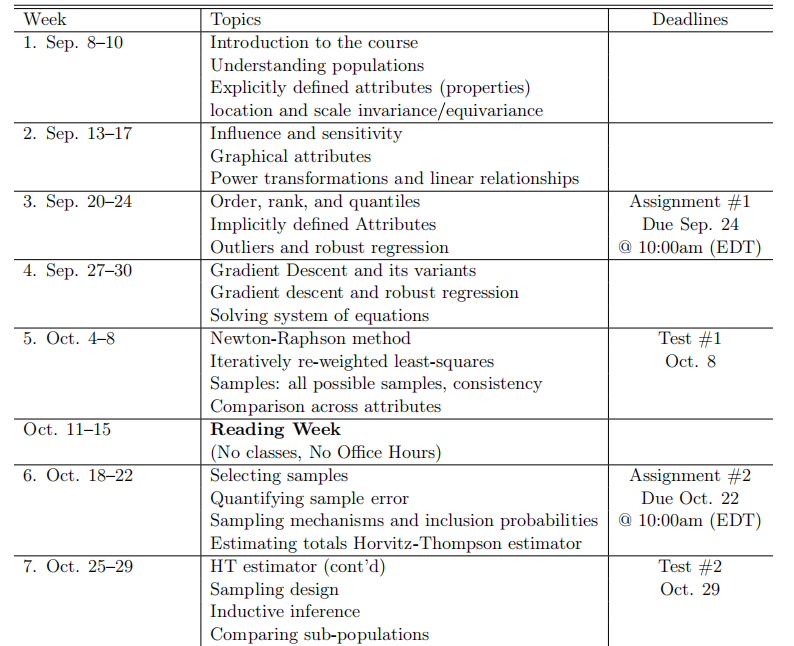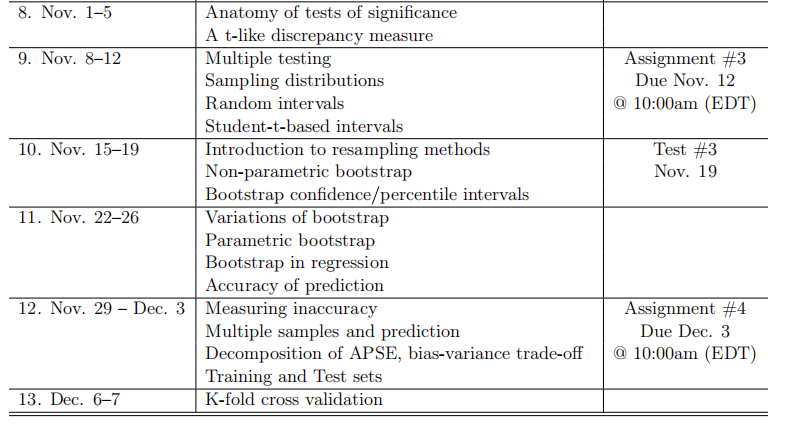STAT 341: Computational Statistics and Data Analysis
计算统计代写 Course Description and Objectives: This is a computationally focused approach course to statistical reasoning in the context of…
- Lecture Times: No synchronous lectures. All lectures to be posted online.
- Tutorials: Virtual, See LEARN
- Instructor: Arash S.Dahaj (a4soleim@uwaterloo.ca)
- Offiffiffice Hours: See LEARN
Course Description and Objectives: This is a computationally focused approach course to statistical reasoning in the context of real data. Functional programming in R and algorithms will be used to defifine interesting attributes of fifinite populations and their sampling characteristics. Computational approaches to inductive inference and the assessment of predictive accuracy will also be discussed. By the conclusion of this course, successful students should have achieved the following objectives: 计算统计代写
- Understand the fundamentals of population-based statistical analyses, as well as implicitly/explicitly defifined population attributes,
- Understand the basics of sampling and the underlying ideas/mechanisms of probability sampling and related issues
- Understand the basics of inductive inference including target and study populations, measurements, comparing subpopulations, random intervals and coverage probabilities, and resampling methods such as bootstrap
- Understand the fundamentals of prediction and how its accuracy is measured
- Understand generative models and inference based on sampling, density estimation, and fifinite mixture distributions
- Understand the basics of discriminant analysis and classifification
- Be able to generate high-quality visualization and inferential statistics R output for the topics above.
Course Website: All recorded lectures, slides, course announcements, exercises, updates, assignments, R codes, solutions, extra materials, handouts, data-sets, grades, etc. will be posted on LEARN.
Course Topics and Tentative Schedule: The tentative dates are subject to change. 计算统计代写


Course Material: There is no required text for this course. An older version of the notes is posted here. The lectures notes posted on LEARN have been broken up into weeks, sections, and subsections. To facilitate everyone’s difffferent approach to online and learning in general, I have tried to create a variety of ways to interact with the notes. Each folder will contain fifive fifiles, e.g. for section 2.1-Populations we have

Exercises: There are problems with solutions posted on LEARN grouped by the following sections; Populations Explicit, Populations Implicit, Samples, and Prediction.
Virtual Offiffiffice Hours: Offiffiffice hours are held through WebEx and/or Virtual Classroom under the Connect tab on LEARN. The timing of the offiffiffice hours and how to attend are announced on LEARN. You may attend the offiffiffice hours with your phone, tablet, or computer. If you would like to ask questions, you need to have a microphone. Having a webcam is not required for the offiffiffice hours, but it is strongly encouraged.
Virtual Tutorials: The weekly tutorials will generally be held as optional help sessions during which a TA or the instructor will go over the R code and some supplementary questions related to assignments. 计算统计代写
- The time and date will be posted on Learn.
- The sessions will be recorded for future viewings.
Software Use: The free statistical package R (available here for free download) is the formal statistical software for data analysis in this course. In particular, we will use RStudio throughout the course (available here for free download). Please make sure your R and Rstudio are the most up-to-date version as this has caused students issues in previous terms of the course. Throughout the semester we will discuss sample outputs so you can do the assignments and interpret the outputs which may appear in assignments, tests, and the fifinal exam. R is available on the machines in the computer labs to which you have access. For remote access, using Windows, you need a remote desktop connection to windows.student.math.uwaterloo.ca and for Linux, ssh to student.math.uwaterloo.ca. On Mac, you can use either method.
- You are welcome to use R libraries and/or packages such as tidyverse, lubridate, purrr, e.g. dplyr instead of base functions. Any packages like those, that help with managing data, etc, are fifine. The only time you may run into trouble is if you call a function from a package to handle a task you have been asked to code out explicitly. For example, if you are asked to code a function that calculates the mean of a vector in R,and your solution is to just call the function mean(), then you will not receive any marks.
Assignments: There are 4 assignments in this course due on the following dates and times: 计算统计代写
- Assignment #1 : Friday, September 24 at 10:00am (EDT)
- Assignment #2 : Friday, October 22 at 10:00am (EDT)
- Assignment #3 : Friday, November 12 at 10:00am (EDT)
- Assignment #4 : Friday, December 3 at 10:00am (EDT)
All assignments must be completed using RMarkdown. You will have at least one week (if not more) to complete each assignment, which will be submitted to Crowdmark. It is extremely important that you follow the instructions outlined in each and every assignment which include the submission format, deadline, lateness penalty, academic integrity rules, etc.. It is your responsibility to familiarize yourself with RMarkdown environment to make sure you can compile and submit your assignments before their deadlines.
- Assignment format policy: Using RMarkdown or LATEX is required and no handwritten and/or imported screenshots will be accepted in the assignments. A mark of 0% will be assigned to the questions which were not complied in RMarkdown or LATEX, and/or those which include hand-written solutions and/or screenshots. Some questions will explicitly allow handwritten solutions.
-
Rules for Co-operation or Collaboration: Students are encouraged to discuss assignment exercises with each other, the TAs, and the course instructor. Any assistance must be limited to discussion of the problem and sketching general approaches to a so lution. Each student must submit his/her own unique solution, code, results and interpretations, e.g. never send or show your solution or code to another student. However, please feel free to discuss any diffiffifficult ideas or concepts but remember solutions are required to be written in your own words. 计算统计代写
- Rules for Aids, Assistance and Plagiarism: Consulting another student’s solution is prohibited, and submitted solutions may not be copied from any source. In particular, submitting solutions copied in whole or in part from an assignment submission or solu tion key from a previous offffering of this course, or from an offffering of any other course, is forbidden, even if a student is resubmitting their own work. These and any other forms of collaboration on assignments constitute cheating. Suspected cases of cheating will be immediately forwarded to the Associate Dean. If you have any questions about whether some activity constitutes cheating, please ask the instructor.
Late submissions policy: There is a 20%-per-hour penalty for late submissions for assignments, and q 2%-per-minuet penalty for timed tests. These penalties are FOR THE ENTIRE PAPER starting immediately after the deadline. Please be aware that although you can make as many submissions as you wish before the deadline, Crowdmark will only accept one submission after it has passed (and this is only if you have not submitted anything at all before the deadline). If you do have to submit an assignment late, you must make sure that yoursubmission is complete: upload all of your fifiles and then click the “submit” button. If you start uploading a fifile a few minutes before the deadline but submission process completes after the deadline, you will be penalized for late submission. Do not leave your submission until last minute.
Tests: There are 3 tests that will be administered online through Learn and Crowdmark .The details will be posted on Learn. The tests are tentatively scheduled on:
- Friday, October 8,
- Friday, October 29, and
- Friday, November 15
Grading Scheme: 计算统计代写
Course Grade =40% Assignments + 30% Tests + 30% Final Exam
To earn a grade of ≥50% in the course, one must earn at least 50% in each and every category: assignment, tests, and the fifinal exam.
Online Interviews: Violations of academic integrity are not tolerated and will be taken very seriously. I may schedule online meetings with you in regards to any of your assignments, tests, or project. During these meetings I will ask you to explain and/or clarify your answers to a test and/or assignment. You are required to have a microphone and a webcam if you are contacted for an online meeting. You can attend the meeting via smart phone, tablet, or your computer. Please note that the outcome of the interview may change your grade.
Turnitin.com: Text matching software (Turnitin®) may be used to screen your papers in this course. Turnitin® is used to verify that all materials and sources in assignments are documented. Students’ submissions are stored on a U.S. server, therefore students must be given an alternative (e.g., scaffffolded assignment or annotated bibliography), if they are concerned about their privacy and/or security. Students will be given due notice, in the fifirst week of the term and/or at the time assignment details are provided, about arrangements and alternatives for the use of Turnitin® in this course. Turnitin is used in this course as one tool to uncover plagiarism. 计算统计代写
One of the factors leading to conducting online interviews is the Turnitin similarity index of your paper. One potential alternative for those who do not wish to submit their assignments to Turnitin will be the online interview. If you do not want to submit your assignments to Turnitin, you must email the instructor before September 17 at 11:59pm EDT.
Q&A: Piazza (www.piazza.com) is an online Q&A platform, and will be widely used in this course. You are encouraged to submit questions you have about the course material on Piazza to discuss with your fellow classmates and TA’s. While the TAs will monitor Piazza regularly, the instructor will pop-in from time to time. If you ask questions about assignments which involve sharing any portion of your solutions, you MUST post your question privately. The instructor will not engage in email communication to answer questions about the course material. You must use Piazza for this purpose. The Piazza link for this term is https://piazza.com/uwaterloo.ca/fall2021/stat341sections12/home.
Marking Concerns: If you have concerns regarding the marking of an assessment, you mustsend an email to the instructor ( a4soleim@uwaterloo.ca) within one week of the date you receive your marked paper, i.e. by 11:59pm EDT 7 days after receiving your paper. No remark requests will be considered after the deadline. If you request a remark, your whole paper will be marked again and your grade may increase, decrease, or stay the same. All requests must be submitted via email (not Piazza). If you request a remark, you must explainclearly which questions are marked unfairly and why you believe that you deserve more points in those questions.
Missed Assessments: The time window to complete an assignment is generous and, in general, a sickness lasting a few days will not be enough of a reason to ask for alternative accommodations and/or an extension on an assignment even with adequate written documentation (e.g. a doctor’s note pertaining to a health-related situation). It is expected that you will use the whole time-window for each assignment in its entirety to complete the assignment and not leave it for the last few days.
[N.B. If you have read this far in the course syllabus, I’d like it if you could send me an email with the subject line ‘STAT 341 MEMES’ and one of your favourite pictures from the Internet. This won’t actually benefifit you, but it will make me happy to know some people read the course syllabus.] If you believe that you have justififiable grounds for missing an assignment or test, you must email the instructor within one week of the missed deadline, i.e. by 11:59pm EDT 7 days after the deadline. What accommodation is made (if any) will be dealt with on a case-by-case basis. While redistributing the weights will be considered, it is quite likely that your assignment or test will be, in part or totally, replaced by an oral examination.
Communication: When you email your instructor, make sure you include the following information in your email: 计算统计代写
- Course: STAT 341
- The name with which you are registered in the course (your offiffifficial name)
- Your student ID number AND your UW/Quest user ID
I know this sounds like a lot, but it helps me fifind information on Crowdmark or LEARN for you faster.
Important note: Including non-English characters in your email (sometimes imposed by installing a non-English operating system) prompts UW servers to spam your emails for the instructor. These characters most often appear in (not exclusively) the subject line, From, To, and Date/Time portions of previous communications if you reply to an email. As a result, I may not receive your email if you fall in this category. You must use the web-based email platform if you suspect that you have non-English characters in your emails imposed by your computer, phone, tablet, etc.
UW and Other Academic Policies: 计算统计代写
- At no point should any student post any course material including, but not limited to, recorded lectures, slides, practice problems, assignments, quizzes, solutions, etc. to any website except LEARN and Piazza. All course material is the intellectual property of theinstructor and the University of Waterloo. Stating or clicking a box indicating that you are the owner of this material is fraudulent. Students who are caught or suspected of sharing materials online will be reported to the Dean’s Offiffiffice.
- A sample solution will be posted on LEARN or discussed during the tutorials following each assignment due date and/or test. Please review these solutions before emailing your marking concerns and requesting a remark of your paper.
- A student who believes that a decision affffecting some aspect of his/her university life has been unfair or unreasonable may have grounds for initiating grievance. Read Policy 70, Student Petitions and Grievances, Section 4 here. When in doubt, please be certain to contact the department’s administrative assistant who will provide further assistance.
-
Persons with Disabilities: The offiffiffice for AccessAbility (website here) collaborates with all academic departments to arrange appropriate accommodations for students with disabilities without compromising the academic integrity of the curriculum. If you require academic accommodations to lessen the impact of your disability, please register with AAS at the start of each academic term.
- Academic Integrity: In order to maintain a culture of academic integrity, members of the University of Waterloo community are expected to promote honesty, trust, fairness, respect and responsibility. Grievance: A student who believes that a decision affffecting some aspect of their university life has been unfair or unreasonable may have grounds for initiating a grievance. Read Policy 70 – Student Petitions and grievances, Section Discipline: A student is expected to know what constitutes academic integrity, to avoid committing an academic offffence, and to take responsibility for their actions. When misconduct has been found to have occurred, disciplinary penalties will be imposed under Policy 71 – Student Discipline. For information on categories of offffences and types of penalties, students should refer to: Policy 71 – Student Discipline.
- Avoiding Academic Offffences: For information on commonly misunderstood academic offffences and how to avoid them, students should refer to the Faculty of Mathematics Cheating and Student Academic Discipline Policy. 计算统计代写



